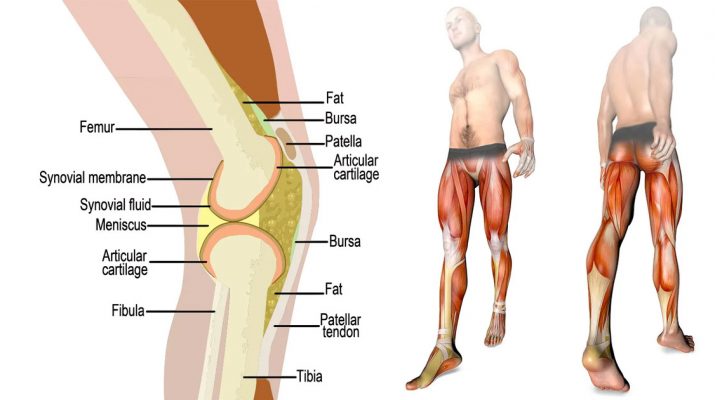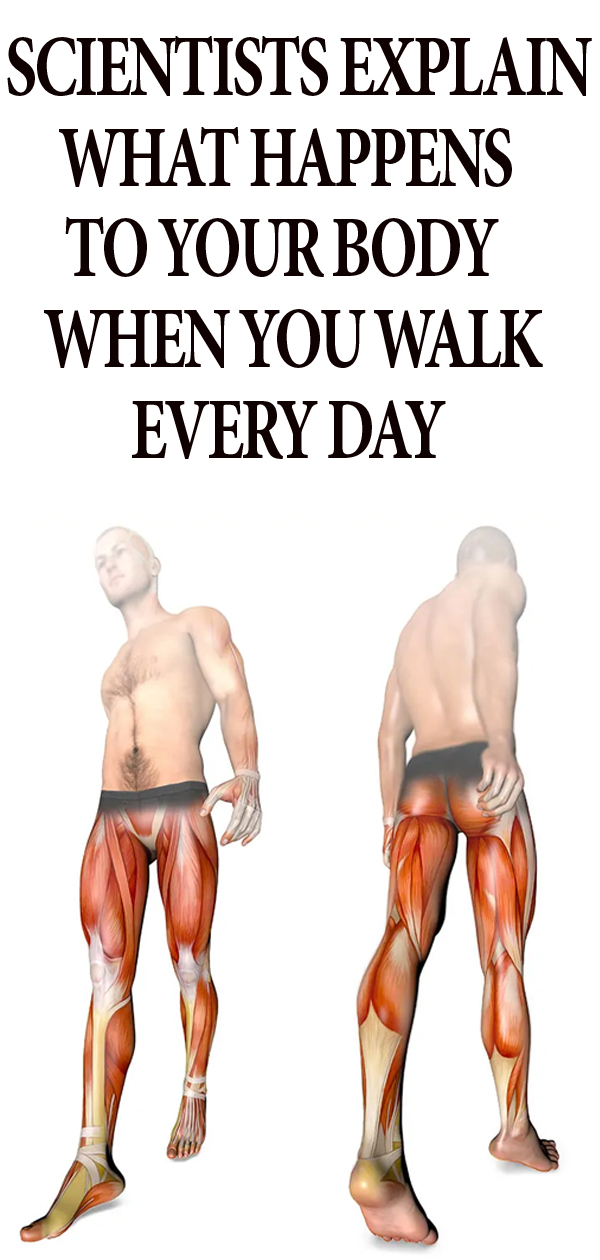Exercise is crucial to one’s physical and mental health. But what if you have no time? Well, the truth is that good exercise doesn’t have to involve intense, long sessions at the gym. All you need to do is take a walk every day. In fact, just half an hour of walking on a daily basis can help you feel much better and make positive changes to your health.
Don’t think you need this? Well, ponder this: how much physical activity to you fit into your day? For one-third of all people, the answer is “not nearly enough” on a weekly basis – and for 95% of people, the exercise of any kind isn’t even a daily endeavor. Yikes!
Don’t fret, though! As we’ve said, you don’t have to perform serious strength-training or expend all your energy running on a treadmill to enjoy benefits. Here’s how scientists explain what happens to your body when you walk every day.
Scientists Explain What Happens To Your Body When You Walk Every Day
1. Improved Vision
Yes, it’s certainly surprising, but did you know that regular walks can do wonders for your vision? Though exercise isn’t necessarily closely linked to your eyes, your vision can still benefit from walking every day, according to the American Academy of Ophthalmology.
One condition that is greatly assisted by regular walks is glaucoma. This condition occurs partially due to pressure placed on the eyes, and walking can help to reduce this pressure. Blood pressure surrounding the eyes needs to be at a healthy level to avoid the disease.
Considering the severity of glaucoma and the steadily increasing number of cases – estimated to hit 111.8 million individuals between 40 and 80 years of age by the time we reach 2040 – it’s no surprise that you’d want to take precautions against it. Walking is a great way to do so.
Walking is capable of lowering the overall risk of developing this eye condition by a whopping 73%. As such, it’s safe to say that eyes functioning in a positive way and with good vision can actually be a result of regular physical activity.
2. Better Heart Health
As an exercise, walking provides countless benefits for a wide variety of reasons. One of its most obvious and enticing positive sides is its ability to lower the risk of developing a variety of cardiovascular conditions.
Basically, walking every day can improve your heart health. Studies have revealed a number of things regarding the links between walking as an exercise and the condition of one’s cardiovascular system. Here are a few heart-related areas that enjoy positive benefits from daily walks:
- Lowered blood pressure
- Better blood circulation
- Stronger heart rate
- Better cholesterol balance
- Better fat balance
- Improved oxygen circulation
- Stronger organs
- Lowered risk of stroke
- Reduced risk of coronary issues
- Lowered risk of heart disease and failure
3. Better Bone And Joint Strength
Age is the biggest factor in the degeneration of bones and joints, but it can affect people of all ages, too. Besides, one of the best ways to prevent age-related degeneration is by making sure you’re constantly adding to the strength of these regions. Walking every day can do just that. Here’s how:
A) Bone Density
Many of us lose bone density as we age. This makes you more susceptible to damage or disease development. Regular physical activity can help to keep the bones strong as they support your weight.
B) Lower Back
When you suffer from lower back pain, it can lead to a decreased focus, an inability to perform daily tasks, and lowered positive thinking. Unfortunately, it’s not a good idea to do intense types of exercise. Running and weight-lifting are likely both off the list, and so is jogging.
This leaves you with walking – and thankfully, it’s a very positive form of physical activity, even for those with this pain. Walking daily can help provide some degree of pain relief from chronic back pain, helping you to manage the discomfort more productively.
C) Spine
This is linked to our previous point on lower back pain. Walking helps to increase healthy blood circulation, allowing you to enjoy better flexibility around your lower back area. This is because blood-flow around the spine tends to greatly increase with exercise.
D) Legs
Alright, so, technically, this isn’t necessarily just about joint and bone strength. But your legs to get stronger and build up muscle and endurance when you walk regularly – especially if you walk uphill. This, in turn, reduces your issues with joint pain around the legs.
E) Stiffness
Do you tend to deal with stiff joints that make it hard to move around? Actively walking for half an hour every day can help loosen up your joints. Although this cannot cure serious diseases like arthritis, it can certainly assist in symptom alleviation.
F) Lower Fracture Risk
It goes without saying that if your joints, bones, and muscles are all stronger, you have a lower chance of developing injuries. Fractures can put you out of commission for months, so lowering your chances of getting one can be a big motivator to get walking.
4. Positive Mental Change
We all seek better mental health and want to be free from negative thoughts and disorders. Walking is a great way to increase this benefit. Believe it or not, walking can have huge effects on your mental health. Here’s how:
A) Depression
Studies indicate that those who walk often during the week – even with just 200 minutes of physical activity – experience an alleviation of some symptoms of diagnosed clinical depression. Over three years, the positive benefits remained as long as this habit was continued.
It is worth noting that the study in question was conducted specifically on women, and therefore may not be entirely true for some. However, research does suggest that all sexes benefit to some degree from regular walking.
B) Stress
If you don’t enjoy power-walking for fitness purposes, a low-intensity stroll through a park is more than enough to help you. Being outdoors and surrounded by greenery can actually help you feel more relaxed.
According to a Journal of Physiological Anthropology study, being around nature and walking for as little as 20 minutes can bring down the levels of cortisol present in the brain. Cortisol is a stress neurotransmitter, and excess production can lead to anxiety, decreased positive thinking, and other issues.
Walking is also capable of bringing the brain into a relaxed and calm state. It does so by stimulating certain nerve cells that work to help calm the senses.
C) Mood
When you walk, positive hormones known as endorphins are produced more and more. This helps you to feel happier and energized during the rest of the day. In fact, even office staff find that half-hour walks make them more eager to continue their work!
D) Cognitive Decline
Dementia and Alzheimer’s are frightening diseases faced by many senior individuals. The risk of developing these degenerative disorders increases as you age. Luckily, daily walking can help reduce that risk. Studies have also found that it can do the same for other brain-related diseases, such as strokes.
In general, walking is also simply good for overall cognitive function. It helps your concentration and memory, and it keeps your head clear so you can make better decisions and think critically.
5. Weight Loss
If you’ve researched ways to lose weight, you’re probably not surprised to hear that a little daily walking can go a long way in helping you shed those extra pounds. Although it’s a simple exercise, it packs a powerful calorie-burning punch! Here’s how that happens:
A) Metabolism
When you walk, your body needs more energy to keep you going. If you walk at a quick enough pace, your body’s metabolism will go up in order to help your body use its energy stores. You can then enjoy faster metabolic rates for a few hours after.
The best way to get this positive effect is to walk at a moderate pace, or, even better, to stride uphill briskly.
B) Fat
Fat isn’t necessarily a bad component on its own, but an excess of fat storage within the body is largely responsible for weight gain and can be potentially dangerous to the body.
In addition, many people feel uncomfortable with their bellies and seek to specifically lose belly fat. All you need to do to begin this effort is to start walking! Do note, though, that you need to walk at a fast enough rate so that your heart rate increases and your breathing becomes deeper.
C) Digestion
After a meal, go for a slow but purposeful walk to help stimulate digestion in your body. This allows your body to begin properly and efficiently digesting what you have eaten, in a positive way, instead of retaining the whole meal as fat.
Studies have indicated that a walk increases the speed of the movement of food through the body and stomach, and multiple other pieces of research support this concept. (5)
D) Muscle Building
Despite being a very low-intensity exercise, walking successfully engages a wide variety of different muscles, allowing for a full-body workout of sorts. Of course, it’s not as effective as strength training or more high-intensity workouts, but it certainly suffices if you’re interested in getting a bit stronger!
E) Blood Sugar
Blood sugar, or blood glucose, must be balanced at a reasonable level to prevent issues such as insulin resistance and type 2 diabetes. Too much blood sugar can also lead to potential weight gain.
Walking after you have consumed food has shown to successfully lower the levels of glucose in the blood, making for a healthier body overall.
Of course, keep in mind that daily walks work best with other weight loss methods, such as a balanced, healthy diet, and perhaps some additional forms of exercise. However, to start you off on the right foot, walking every day is certainly a good practice.
Final Thoughts On What Happens To Your Body When You Walk Every Day
Not everyone has time to hit the gym. But for just 30 minutes a day, you can greatly improve your health just by taking a walk. You can do so during your lunch break, after a meal, or even just to pass the time. You’d be amazed at how much even simple physical activity can do for you!


